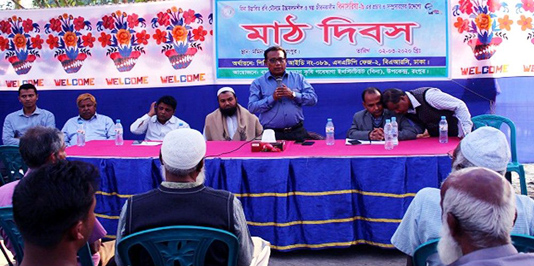RANGPUR, Mar 4, 2020 (BSS) – Agriculture experts at a farmers’ field day
event have called upon farmers for expanding cultivation of short duration
BINA Sarisa-9 adopting newer cropping pattern to reap more profits.
They expressed the view at the event organised by Rangpur Sub-station of
Bangladesh Institute of Nuclear Agriculture (BINA) at village Moktarpara in
Sadar upazila of the district on Tuesday afternoon.
The event was arranged to inspire farmers in expanding cultivation of BINA
Sarisa-9 variety of mustard adopting the mustard-based cropping pattern in
between Transplanted Aman (T-Aman) rice and Boro rice cultivation during the
Rabi season.
Deputy Director of the Department of Agricultural Extension (DAE)
Agriculturist Dr. Mohammad Sarwarul Haque attended the occasion as the chief
guest with local farmer leader Obaidul Islam Mintu in the chair.
Sadar Upazila Agriculture Officer Agriculturist HM Moniruzzaman Rabbani
and Senior Scientific Officer of Rangpur Sub-station of BINA Agriculturist
Mohammad Ali attended the function as special guests.
Senior Scientific Officer at Rangpur Sub-station of BINA Agriculturist Md.
Tanzilur Rahman Mondal, its Scientific Officer Agriculturist Md. Motabber
Rahman and Sub-assistant Agriculture Officer of the DAE Pijush Mohanta also
spoke.
Agriculturist Mohammad Ali discussed cultivation technology and agronomic
management of short duration BINA Sarisa-9 variety of mustard to
participating farmers for increasing production of the oil seed.
Agriculturist Tanzilur Rahman said the yield rate of BINA Sarisa-9 variety
of mustard is higher than other traditional varieties and brings rewarding
profits to farmers.
The chief guest said farmers can easily cultivate BINA Sarisa-9 on the same
land where they cultivate T-Aman rice and Boro rice annually to increase crop
intensity along with earning more profits.
“Adoption of the mustard-based T-Aman rice-Mustard-Boro rice cropping
pattern allows farmers to cultivate three crops on the same land annually
where they generally cultivate only two crops of T-Aman rice and Boro rice,”
he said.



